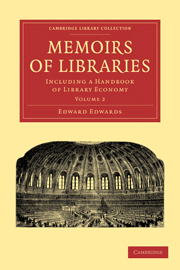Book contents
- Frontmatter
- Contents
- Chapter XV The Older Libraries of English Towns, and Their Management By Munic
- Chapter XVI The Parochial and Quasi-Parochial Libraries of England
- Chapter XVII The History of The “Public Libraries Acts” of 1850 and 1855
- Chapter XVIII The Working of The Public Libraries Acts of 1850 and 1855
- Appendix to Volume I
- Part The First. History of Libraries (Continued.)
- Book IV. The Libraries of The United States of America
- Book V. The Modern Libraries of Continental Europe
Chapter XVI - The Parochial and Quasi-Parochial Libraries of England
Published online by Cambridge University Press: 29 August 2010
- Frontmatter
- Contents
- Chapter XV The Older Libraries of English Towns, and Their Management By Munic
- Chapter XVI The Parochial and Quasi-Parochial Libraries of England
- Chapter XVII The History of The “Public Libraries Acts” of 1850 and 1855
- Chapter XVIII The Working of The Public Libraries Acts of 1850 and 1855
- Appendix to Volume I
- Part The First. History of Libraries (Continued.)
- Book IV. The Libraries of The United States of America
- Book V. The Modern Libraries of Continental Europe
Summary
… . Per secondare l’istruzione delle scuole, e dar ogni ajuto al clero studioso, avevano le Chiese le loro Biblioteche, che de’ più opportuni libri procurovano fossero arricchite. Di Panfilio Martire dice San Girolamo, che nell’ ardore di ben corredare la sacra Biblioteca non voleva cedere alle premure di Demetrjo Falereo e di Pisistrato per cercare ogni sorta di buoni libri. La Chiesa Gerosolimitana conservava una copiosa Libreria, di cui era stato fondatore il vescovo Alessandro, e dagli scritti di questa aver ricavata Eusebio gran parte delle storiche sue notizie egli stesso confessa. etc.
andRES, Dell’ origine, de’ progressi e dello stato attuale d’ogni letteratura, i, 159-160. (Ed. of 1783.)The simple words of our good old English Bible are consecrated sounds; They ring in The depths of our heart like The holiest memories; . . . . . are associated with fields of conflict; with meek and patient martyrdoms; with successful missions; with all that is dearest and deepest, and most stirring in The great battle of The Christian life.
CUMMING, Revision of The Bible, 290.IT is more than probable that throughout all Christendom The earliest Libraries were Church Libraries.The necessity that those whose lives were to be spent in teaching and preaching should Themselves continue to be taught and exhorted, sustained and comforted, by books, must everywhere have made itself apparent.
When The great Reformation introduced new relations between priests and people, The Churches, and preeminently our English Churches, came to be in a special sense The Libraries of The Laity. It was There that The popular mind first became deeply imbued with The precepts, The discipline, and The consolations of The Bible, not alone by listening to pulpit exposition, and thus “receiving The word with all The readiness of mind,” but by “searching The Scriptures daily, wheTher those things were so.”
Within a few years of that bitter hostility to The very idea of a Bible for The people which had driven Tyndal across The Channel in order to work, with all his soul, at his translation, The demand for one—whatever The motive—came from The royal lips.
- Type
- Chapter
- Information
- Memoirs of LibrariesIncluding a Handbook of Library Economy, pp. 752 - 771Publisher: Cambridge University PressPrint publication year: 2010First published in: 1859

